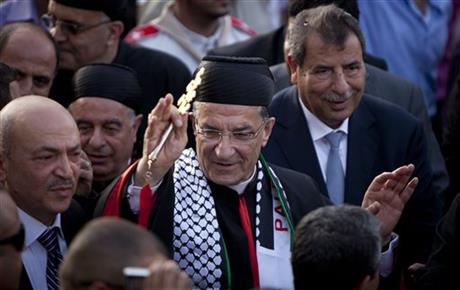KUFR BIRIM, Israel (AP) — The head of Lebanon’s largest group of Christians, the Maronite Catholics, was making two politically charged stops Wednesday in his precedent-setting pilgrimage to the Holy Land, a trip that has been overshadowed by criticism back home.

Cardinal Bechara Rai — the first Lebanese religious leader to visit Israel despite the formal state of war between the two countries — was meeting with two very different groups of Maronites in northern Israel.
One community has been locked in a 66-year-old struggle with the Israeli authorities to return to its village. The other fought alongside Israeli troops in south Lebanon in the 1980s and 1990s.
In the morning, Rai led prayers and a religious procession in what remains of Kufr Birim, a Maronite village just south of the Lebanese border.
Israeli forces demolished Kufr Birim in 1953, five years after persuading hundreds of residents to leave with the promise of a speedy return that never materialized. Now scattered across northern Israel, the villagers’ descendants continue their struggle to return.
In the afternoon, Rai will celebrate Mass on the shores of the Sea of Galilee for former Lebanese militiamen who helped Israel maintain an 18-year military occupation of southern Lebanon.
The militiamen and their families fled to Israel, many with just the clothes on their backs, after Israeli troops hastily withdrew from Lebanon in May 2000, leaving their former allies exposed to possible retribution.
Both groups view the cardinal as a rare link to their religious compatriots across the border in Lebanon. The number of Maronites is estimated at about 850,000 in Lebanon, compared to about 11,000 in Israel.
The cardinal’s visit gives us hope that someone didn’t forget us … and someone is fighting for us, that they want us to come back home, said Vivian Shadid, 25, whose father was an officer in the Israeli-allied militia, the South Lebanon Army.
The former militiamen are widely considered as traitors in Lebanon, though a majority of those who did go back received relatively light sentences. Shadid said ex-fighters and their families in Israel number about 3,500 but that more have either returned to Lebanon or emigrated to the West.
Rai has said he is on a spiritual journey, rejecting claims by critics back home that his visit implies a normalization of ties between Israel and Lebanon. The two countries remain formally at war and Israel has invaded Lebanon several times since the 1970s. A 2006 war left 1,200 Lebanese and 160 Israelis dead.
Lebanon bans its citizens from visiting Israel, but makes an exemption for Maronite clergy who need to tend to their flock.
Rai’s Holy Land pilgrimage began on Sunday in Bethlehem, followed by stops in Jerusalem and Israel’s coastal metropolis of Tel Aviv. In Bethlehem and Jerusalem, he joined prayers led by Pope Francis.
On Wednesday, he visited Kufr Birim to show support for the descendants of some 1,000 villagers uprooted in the Mideast war over Israel’s 1948 creation. In all, more than 700,000 Palestinians fled or were forced out during the fighting.
Dressed in a white robe and gold-embroidered miter, he held up two gold-colored crucifixes as he made his way from the main road to the small village church, accompanied by several hundred people. Worshippers clapped and snapped photos as he entered the stone building.
Later, the cardinal said he would send a letter to the pope on behalf of the people of Kufr Birim. The only way is through the Vatican because we cannot deal with the state, he said, referring to Israel.
The exodus from the village took place in November 1948, six months after Israel was founded. At the time, Israeli troops told Kufr Birim residents they must leave for security reasons, but would be allowed to return after two weeks, residents said.
Israel didn’t keep its word and the Defense Ministry later ignored a Supreme Court ruling allowing the residents of Kufr Birim and of another Christian village to return home.
Instead, the military destroyed Kufr Birim in 1953 as part of an attempt to create a security belt without Arabs near the border with Lebanon, said veteran Israeli journalist Danny Rubinstein.
Israeli historian Tom Segev said Israeli governments also wanted to avoid the precedent of allowing uprooted Arabs to return to their communities.
Many of the villagers now live in Jish, a community just five kilometers (three miles) from Kufr Birim, but they keep up ties to the old village.
Only the church and a one-room village school remain intact, but villagers celebrate weddings and bury their dead in Kufr Birim.
For the past 10 months, activists have maintained a steady presence, sleeping in tents pitched in the school. They have cleared weeds from the village paths and affixed photos of the original owners to partial house walls still left standing.
The cardinal’s visit can help with the religious side of things, said one of the activists, 22-year-old Saher Geries. But politically, what we are doing now is going to advance the issue of return, he added.
A few said they want Rai to negotiate a possible solution directly with the Israeli authorities.
We need to make progress and reach an understanding with our Jewish brothers, said Shadi Haloul whose grandfather is from Kufr Birim and who, unlike the vast majority of Israel’s Arab citizens, served in the Israeli military.





